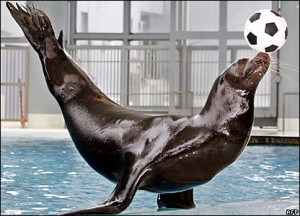When I was younger my favorite place was the aquarium at the boardwalk near me. I had my birthday there every year until I was 8 because I loved the animals. In particular, my favorite was a seal, named Lucille, who had been blinded in an accident with a boat and had been rescued. She was trained to do tricks, which according to the aquarium staff, were rehabilitation exercises. She was my favorite.
This image of the seal reminds me of Lucille and her tricks. It is taken from a Sea World seal show and depicts a seal balancing on its flippers while balancing a soccer ball on its nose. The seals are trained by rewarding them with food after they preform a task correctly. While it appears that the seal enjoys doing the tricks, after reading Berger’s essay I look at this differently because as humans, how do we know that the seal is experiencing pleasure in performing. This isn’t a behavior that they exhibit in the wild so are we forcing the seal to learn tricks solely for our amusement, or is there an advantage to these zoo shows.
I think this example is what Berger refers to as “humans viewing animals as toys for our amusement”. After reading Berger’s essay, I can understand his opinion on animals in captivity, especially as they grew in popularity with children, animals have almost become like toys, instead of just our companions. It is very common to teach domesticated pets, like dogs, obedient behavior and while it does not seem to bother a domesticated animal, is it fair to train wild animals to do tricks as well in zoo performances?
On page 23, Berger states, “A zoo is a place where as many species and varieties of animal as possible are collected in order that they can be seen, observed, studied.” He is stating here that we are viewing animals as things that we can collect and categorize and analyze as though they weren’t living, creatures. He goes on to discuss how captivity makes it possible for humans to view animals like they would view art in a gallery. I think this is a fair statement however, I disagree with his generalization that zoos are not useful. While I agree that zoos aren’t always the best solution and agree that they really can emphasize human control over animals, I think they help us learn and understand animals we can’t normally interact with. Because humans are able to get up close and interact with animals (like tigers, elephants, polar bears etc.) safely, we are able to make relationships with animals that, if we never got to develop this relationship with them, we wouldn’t appreciate them and would see them as vicious and dangerous to us.
I think zoos have allowed us to better understand animals and save some species from extinction by keeping them in captivity. While it’s not always a wonderful solution it has really helped bring about preservation movements and I believe that they can be critical in preserving our environment. Because we are now able to develop companionship with animals that we never would have before, humans begin to care about what happens to polar bears for example because we can safely look one in the eyes and understand why we should save such a beautiful creature. I don’t however, think that there is a necessity for animal shows. By forcing them to preform tricks and behaviors they would never do in the wild, we are purely using them for entertainment. While we don’t think that these tricks harm the animals, how can we be sure that the animals are finding enjoyment out of this? I think that zoos can be very beneficial to the preservation of the environment, but, after reading Berger’s essay, I believe that the tricks and shows are purely an instance of us using the animals as our toys.

Leave a Reply